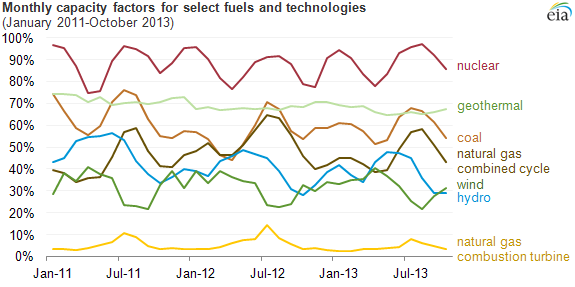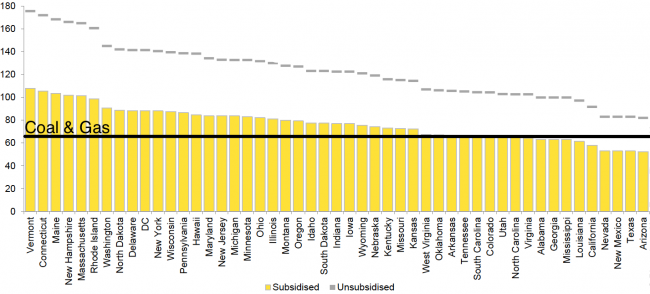The Wrong Way to Sell Wind and Solar
A reader sent me this article on renewables by Tom Randall at Bloomberg. I would like to spend more time thinking about it, but here are a few thoughts. [Ed: sorry, totally forgot the link. duh.]
First, I would be thrilled if things like wind and solar can actually become cheaper, without government subsidies, than current fossil fuels. I have high hopes for solar and am skeptical about wind, but leave that aside.
Second, I think he is selling renewables the wrong way, and is in fact trumpeting something as a good thing that really is not so good. His argument is that the decline in capacity factors for natural gas and coal plants is a sign of the success of renwables. The whole situation is complex, and a real analysis would require looking at the entire power system as a whole (which neither of us are doing). But my worry is that all the author has done is to demonstrate a unaccounted-for cost of renewables, that is the reduction in efficiency of coal and natural gas plants without actually being able to replace them.
Here is his key chart. It purports to show the total US capacity factor of each energy mode, with capacity factor defined as the total electricity output of the plant divided by what the electricity output could be if the plant ran full-out 24/7/365.
First, there is a problem with this chart in terms of its data selection -- one has to be careful looking at intra-year variations in capacity factor because they vary a lot seasonality, both due to weather and changes in relative fuel prices. Also, one has to be hugely suspicious when someone is claiming a long term trend but only shows 18 months of data. The EIA can provide some of the data for a few years ahead of his table. You can see it is pretty volatile.
I won't dwell on the matter of data selection, because it is not the main point I want to make, but the author's chart looks suspiciously like cherry-picking endpoints.
The point I do want to make is that reducing the capacity utilization, and thus efficiency, is a COST not a benefit as he makes it out. Things would be different if renewables replaced a lot of fossil fuel capacity at the peak utilization of the day (the total capacity of a power system has to be sized to the peak daily demand). But the peak demand in most Western countries occurs late in the day, long after solar has stopped producing. Germany, which relies the most on solar, has studied this and found their peak electricity demand is around 6PM, a time where solar provides essentially nothing. Wind is a slightly different problem, because of its hour to hour unpredictability, but suffice it to say that it can't be counted on in advance on any particular day to provide power at the peak.
This means that one STILL has to have the exact same fossil fuel plant capacity as one did without renewables. Yes, it runs less during the day and burns less fuel, but it still must be built and exist and be staffed and in many cases it still must be burning some fuel (even if producing zero electricity) to be hot and ready to go.
The author is arguing for a virtuous circle where reductions in capacity factors of fossil fuel plants from renewables increases the total cost per KwH of electricity from fossil fuels (because the capital cost is amortized over fewer kilowatts). This is technically true, but it is not the way power companies have to look at it. Power companies have got to build capacity to the peak. With current technologies, that means fossil fuel capacity has to be built to the peak irregardless of their capacity factor. If these plants have to be built anyway to cover for renewables when they disappear during the day, then the capital costs are irrelevant at the margin. And the marginal cost of operations and producing power from these plants, since they have to continue to exist, is around $30-$40 a MwH, waaaay under renewables still.
In essence, the author is saying: hurray for renwables! We still have to have all the old fossil fuel plants but they run less efficiently now AND we have paid billions of dollars to duplicate their function with wind and solar plants. We get to pay twice for every unit of electricity capacity.
Environmentalists are big on arguing that negative externalities need to be priced and added to the cost of things that generate them -- thus the logic for a carbon tax. But doesn't that mean we should tax wind and solar, rather than subsidize them, to charge them for the inefficiently-run fossil fuel plants we have to keep around to fill in when renewables inevitably fail us at the peak time of the day?
By the way, speaking of subsidies, the author with a totally straight face argues that renewables are now cheaper than fossil fuels with this chart:
He also says, "Wind power, including U.S. subsidies, became the cheapest electricity in the U.S. for the first time last year."
I hate to break it to the author, but a Ferrari would be cheaper than a Ford Taurus if the government subsidized it enough -- that means nothing economically other than the fact that the government is authoritarian enough to make it happen. All his chart shows is that solar is more expensive than coal and gas in every state.
And what the hell are those units on the left? Does Bloomberg not know how to annotate charts? Since 6 cents per Kw/hr is a reasonable electricity cost, my guess is that this is dollars per Mw/hr, but it is irritating to have to guess.


